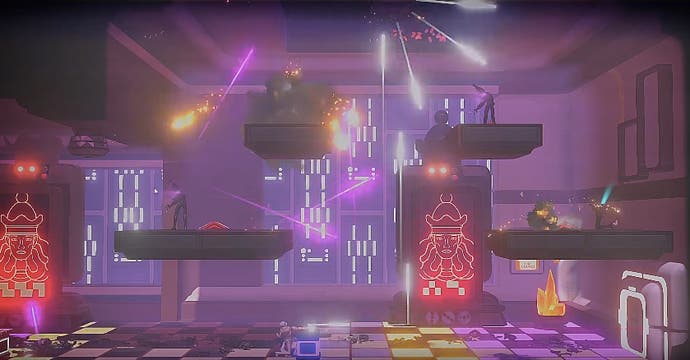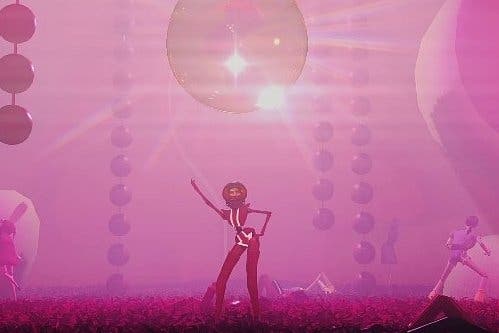Is Headlander Double Fine's most whimsical game since Psychonauts?
Show me what you got.
Double Fine has experimented with all manner of projects, including a nostalgic Peanuts-like Halloween-themed RPG, a mech combat tower defense game, a Kinect-based Sesame Street spin-off and a Kickstarter-funded retro throwback to the point-and-click adventures of yesteryear. But the game its upcoming sci-fi comedy romp Headlander most reminds me of is arguably Double Fine's most beloved title: its debut effort (and Eurogamer's 2005 game of the year), Pyschonauts. Where Raz's summer camp adventure had you venturing inside other people's heads, Headlander lets you steal anyone else's head and replace it with your own sentient floating noggin.
This is because you're the last biological creature left in the galaxy, while everyone else has had their persons uploaded into digital data and lives like Scarlett Johansson in Her. As such, anyone else's body is naught but a hollow vessel ripe for the possessing. You see, you're not just any floating head, but a floating head equipped with a cool vacuum that lets you suck the skull off anyone you come across before replacing it with your own.
It's a great visual gag, especially when you latch your perpetually bewildered avatar onto the body of a robot dog, trophy steer or novelty snowman. Each corporeal form comes with its own moves too, be they cosmetic (like different dances) or practical (like various guns). If it sounds a bit like Stacking, the Double Fine game about body-swapping through Russian nesting dolls, that's because it's headed (no pun intended) by the same project lead, Double Fine's art director Lee Petty.
The demo I see at a Seattle hotel is set in a resort-themed space station called the Pleasure Port. It's complete with a hookah lounge, dance floor and, my favourite, the Fondlarium, where digital human consciousnesses relish the feel of shag carpet and cushy pillows through their robotic bodies.
It's a good life, but a calm one. An ominous robotic entity called Methuselah has control of the systems that allow for this incorporeal form of humanity, and has implanted a program that keeps everyone's emotions in check, so they don't feel too much joy or sorrow. How this computer took over, why you're just a head, where you've come from, and who the mysterious Sam Elliott-like narrator Earl is, remain mysteries as we enter this unsettling quasi-idyllic world.
What strikes me most about Headlander, besides its gloriously retro 70s sci-fi aesthetic, is the sense of discovery as you press upon the edges of the playing field in search of new gags. While Broken Age was funny, its humour was of a more mannered, scripted variety. Headlander harks back to Psychonauts' psychic powers having unpredictably farcical effects on your surroundings. Many of Headlander's citizens don't offer unique practical skills, but simply different amusing animations. A slick disco stud struts down the club like John Travolta in Saturday Night Fever, while a slender, chic woman sashays as she saunters down the hall. People will react to you differently based on whose frame you're sporting.
A lot of the humour isn't planned, however, and is more emergent from the sorts of screwball combat situations you wind up in. Similarly to Shadow Complex before it, Headlander allows you to take cover and ricochet shots around the room. This is useful as you sometimes need to be precise if you want to shoot off an enemy's head or open a door from afar by zapping it. Frequently the puzzles and combat will organically flow together as you try to avoid enemy fire while altering your positioning and abilities through body snatching. While your head has regenerating health, the bodies you possess do not, so head hopping is instrumental in the heat of battle.

Not all characters you head-land into will offer unique abilities, but simply having a body is important to both combat and puzzles. You can use any body's self-destruct mechanic in combat, open doors with them, or body-swap to avoid detection. While not explicitly a stealth game, there is a high degree of manipulation and trickery that goes into Headlander. It's a little like playing a mischievous version of The Thing, and Petty's whimsical space-age wonderland is the perfect place to wreak havoc.
As with any non-linear "Metroidvania" adventure, there's a big incentive to backtrack, though Petty points out that this will be largely optional. "We don't force re-traversal. We don't force you to go through all the upgrade trees. But we encourage it," he tells me. One way Double Fine does this is through randomly generated character placement, which not only makes the world feel more alive, but offers new and interesting challenges and screwball scenarios as you retread old ground. That's something that certainly helps set Headlander apart from previous, more traditional Double Fine adventures like Broken Age or Psychonauts, where NPCs would remain locked to the same spot.
The Metroidvania genre is having something of a resurgence these days with titles like Ori and the Blind Forest, Axiom Verge and Guacamelee! making it increasingly difficult to stand out from the pack. Yet Headlander still manages to do just that thanks to its emphasis on experimentation and comedy. From a 20-minute hands-off demo its individual mechanics look fun, if not revolutionary. Instead, it's the humour, art direction and wealth of amusing hidden interactions that make Headlander's charm unique among all the other games trying to recreate the magic of Samus Aran's earliest adventures, just as Psychonauts stood apart from its platforming competitors a decade ago. Only where vintage Double Fine games like Psychonauts and Brutal Legend felt like unremarkable mechanics unceremoniously tethered to remarkable writing, Headlander understands that the core gameplay tells just as much of a tale as any dialogue or scripted plot points. In short, this one looks ahead of the curve.










